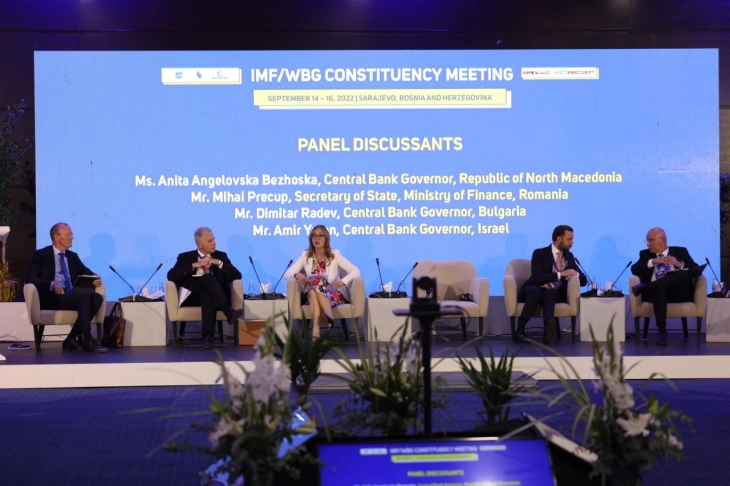Angelovska-Bezhoska: Keeping price stability of crucial importance

Skopje, 16 September 2022 (MIA) – Maintaining price stability is of crucial importance for the maintenance of macroeconomic stability and sustainable economic growth, said National Bank Governor Anita Angelovska-Bezhoska on Friday at the panel discussion titled “The Price to Pay: How to Get Inflation under Control? Insights by Central Banks and Ministers of Finance”, held at the IMF and the World Bank Group Constituency meeting in Sarajevo.
First the pandemic, followed by this year’s military conflict in Ukraine, have caused an increase in global inflation pressures, said Angelovska-Bezhoska.
She pointed out that inflation has risen in every economy, especially in underdeveloped economies, wherein some have an inflation higher than 10%. In Central and Southeast Europe, inflation has grown, on average, to 15.5%. Inflation has sped up in North Macedonia as well, given the fact that our economy is reliant on imports, especially when it comes to energy, as well as the high presence of food and energy in the consumer basket.
“Even though the prices of food and energy sources are the key factor for inflation growth, their long-term and constant growth transfers onto the prices of other goods and services and it affects inflation expectations, especially short-term ones. In such circumstances, central banks must act with their anti-inflation measures, keeping in mind the current unfavorable risks for economic outcomes. That’s why all central banks, including the FED and the European Central Bank are taking measures. This way of leading monetary policies will also affect inflation expectations and it will contribute to the stabilization of medium-term price movements,” said Governor Anita Angelovska-Bezhoska.
Pierre Wunsch, Governor of the National Bank of Belgium, presided over the panel discussion, in which Amir Yaron, Governor of the National Bank of Israel, Dimitar Radev, Governor of the National Bank of Bulgaria, Mihai Precup, Secretary of State in the Ministry of Finance took part, and the Governor of the National Bank of the Netherlands, Klaas Knot gave the opening address alongside the director of the IMF Europe Office, Alfred Kammer.
The participants talked about the challenges that policy makers are facing in times when inflation pressures concern all segments of the economy, emphasizing the significance of good coordination between monetary and fiscal policies for a successful management of challenges, keeping in mind that this can directly mitigate the unwanted effects on the most affected sectors and parts of the population.
“The increase in energy and food prices is large and has been going on for a long period of time. These challenges in price movements are not new for policy makers, but given the high uncertainty surrounding future dynamics in conditions of geopolitical turmoil, great vigilance is needed. In such circumstances, it is of great importance to take balanced and coordinated decisions on monetary and fiscal policy,” the governor emphasized.
She pointed out that structural reforms can also play a role in reducing inflation through measures that enable an increase in aggregate supply. In emerging economies, this implies further measures to improve the business environment, strengthen green investments and increase digitization. The latest measure of the National Bank, which makes changes to the mandatory reserve, as the governor emphasized, is precisely to support investments in renewable energy sources, which affects this structural problem.
The Dutch Constituency of the International Monetary Fund and the World Bank Group, in addition to the Netherlands and North Macedonia, also includes Bosnia and Herzegovina, Bulgaria, Georgia, Armenia, Israel, Cyprus, Luxembourg, Moldova, Romania, Ukraine, Croatia and Montenegro. This year's meeting under the title "From crisis to recovery" is being held from September 14 to 16 in Sarajevo. dk/ba/







